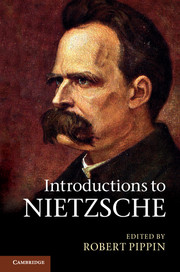Book contents
- Frontmatter
- Contents
- Note to the reader
- Chronology of Nietzsche's life and works
- Introduction
- Chapter 1 Nietzsche: Writings from the early notebooks
- Chapter 2 Nietzsche: The Birth of Tragedy
- Chapter 3 Nietzsche: Untimely Meditations
- Chapter 4 Nietzsche: Human, All Too Human
- Chapter 5 Nietzsche: Daybreak
- Chapter 6 Nietzsche: The Gay Science
- Chapter 7 Nietzsche: Thus Spoke Zarathustra
- Chapter 8 Nietzsche: Beyond Good and Evil
- Chapter 9 Nietzsche: On the Genealogy of Morality
- Chapter 10 Nietzsche: The Anti-Christ, Ecce Homo, Twilight of the Idols
- Chapter 11 Nietzsche: Writings from the late notebooks
- Select bibliography
- Index
- References
Chapter 8 - Nietzsche: Beyond Good and Evil
Published online by Cambridge University Press: 05 June 2012
- Frontmatter
- Contents
- Note to the reader
- Chronology of Nietzsche's life and works
- Introduction
- Chapter 1 Nietzsche: Writings from the early notebooks
- Chapter 2 Nietzsche: The Birth of Tragedy
- Chapter 3 Nietzsche: Untimely Meditations
- Chapter 4 Nietzsche: Human, All Too Human
- Chapter 5 Nietzsche: Daybreak
- Chapter 6 Nietzsche: The Gay Science
- Chapter 7 Nietzsche: Thus Spoke Zarathustra
- Chapter 8 Nietzsche: Beyond Good and Evil
- Chapter 9 Nietzsche: On the Genealogy of Morality
- Chapter 10 Nietzsche: The Anti-Christ, Ecce Homo, Twilight of the Idols
- Chapter 11 Nietzsche: Writings from the late notebooks
- Select bibliography
- Index
- References
Summary
Beyond Good and Evil (BGE) is often considered to be one of Friedrich Nietzsche's greatest books. Though it is by no means clear what criteria this assessment is based on, it is easy to understand how it comes about. It seems to be an expression of the feeling that in this book Nietzsche gives the most comprehensible and detached account of the major themes that concerned him throughout his life. Nietzsche was suspicious of almost everything addressed in this book – whether it be knowledge, truth, philosophy, or morality and religion. He regarded them as the source, or at least the effect, of a misguided tendency in the development of human nature: one that has led to disastrous cultural, social, and psychological consequences. At the same time he lets us share his more constructive views as well, mainly his views on how he wants us to perceive the world and to change our lives in order to live up to this new perception. He speaks of perspectivism, the will to power, of human nobility (Vornehmheit) and of the conditions of a life liberated from the constraints of oppressive tradition. In the middle of the book, he even adds a number of short aphorisms, and he ends the book with a poem that hints at the artistic background to his concern with decadence and the means for overcoming it. Thus it would seem that the whole range of Nietzsche's interests, his prejudices and his preferences, his loathings and his hopes, and above all his deep insights into our situation in the modern world, are united in an exemplary way in BGE, and for this reason it is a great book.
Keywords
- Type
- Chapter
- Information
- Introductions to Nietzsche , pp. 178 - 198Publisher: Cambridge University PressPrint publication year: 2012
References
- 1
- Cited by

